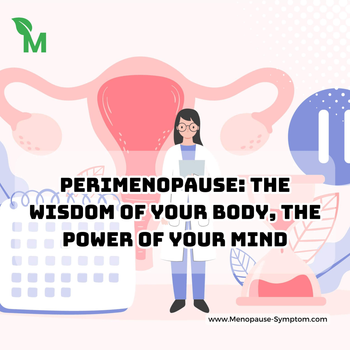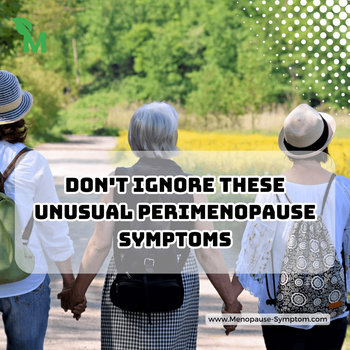Perimenopause: Your Guide To Hormonal Harmony
On
06/10/2024Reading time:
5 min
Summary:
Perimenopause is a natural stage in every woman's life, usually occurring between the ages of 30 to 50. This is the time when the body begins to change, with a decrease in the production of the hormones estrogen and progesterone.
The hormonal system becomes unbalanced, leading to many unpleasant symptoms. Therefore, understanding perimenopause will help you get through this stage more comfortably.
1. When learning about perimenopause, you first need to pay attention to the common symptoms.
These symptoms may include hot flashes, night sweats, mood swings, and difficulty sleeping. These not only reflect problems with your physical health but also affect your mental state and quality of life. Therefore, it is necessary to prepare mentally and have good health before entering perimenopause.
2. Next, to achieve hormonal harmony during perimenopause, a suitable diet is an indispensable factor.
A healthy and balanced diet between green vegetables, fruits and meat, fish, starch, saturated fat and eating time during the day helps the body a lot. You can consider adding foods rich in phytoestrogen such as soybeans, flax seeds, and fruits such as apples, strawberries. These foods can help reduce the unpleasant symptoms caused by perimenopause.
3. In addition to a reasonable diet, exercise also plays an extremely important role in regulating hormones during perimenopause.
Aerobic exercises, yoga, or playing a gentle sport such as jogging, badminton, swimming not only help improve physical health but also reduce symptoms of stress and anxiety, helping you feel more mentally stable. Maintaining regular physical activity will help improve your health, stamina, hormonal balance and mood.
4. Another aspect to note during perimenopause is changes in sleep.
Many women have difficulty sleeping, due to symptoms such as hot flashes, stress or anxiety. A sufficient amount of sleep and quality is very important for overall health. You can improve your sleep by establishing healthy living habits, such as creating a quiet environment for sleeping, avoiding caffeine and heavy foods before bed. Because your body needs to rest and recover after a day of activity and is especially important during perimenopause. Note that getting enough sleep is according to the body's mechanism, sleeping too much during the day can also lead to unwanted problems.
5. Another important issue, monitoring and managing body stress is also an important factor during perimenopause.
Cortisol is a corticosteroid hormone (corticosteroid is a steroid hormone - that is, a natural organic compound synthesized by some endocrine glands in the human body) produced by the adrenal cortex (belonging to the adrenal gland). It is produced thanks to the stimulation of ACTH hormone (produced by the pituitary gland). This is an extremely important cortisol hormone and is considered an anti-stress hormone. It increases blood pressure, increases glycemic, has an immune-enhancing effect (anti-inflammatory), anti-allergic.
Cortisol concentration in blood
· Cortisol concentration from 8am to 12pm: 5.0 - 25.0 µ/dL or 138 - 690 nmol/L.
· Cortisol levels from 12pm to 8pm: 5.0 -15.0 µg/dL or 138-410 nmol/L
· Cortisol levels from 8pm to 8am: 0.0 -10.0 µg/dL or 0 - 276 nmol/L.
Learning more about cortisol and combining it with techniques such as meditation, deep breathing, or yoga can help you reduce stress, thereby balancing hormones.
6. Another option that women often choose is hormone therapy.
This therapy can help regulate hormonal imbalances in the body, thereby reducing symptoms of perimenopause. However, before deciding to use this therapy, you should consult your doctor to determine which method is most suitable for your health condition.
7. Some women may feel uncomfortable talking about perimenopause, but the reality is that it is a natural phase that all women go through.
Instead of avoiding it, sharing and seeking support from friends, family, or professionals can help you feel more comfortable. Consider joining a support group where you can talk to others who have similar experiences, creating a comfortable space to exchange and learn from each other's experiences.
Ultimately, perimenopause is not the end, but a transition, opening up new opportunities for personal growth. This is the stage where you can re-evaluate your life, redefine your values, and discover new passions. Consider this a time to take care of yourself, focus on your health and happiness.
Overall, perimenopause can be well managed if you are proactive in learning and applying the necessary solutions to support your body. Hormonal harmony can be achieved through proper nutrition, regular exercise, stress management, and, when necessary, seeking medical help. This way, you can not only get through this phase smoothly but also enjoy the golden years of your life with full health and energy.
Remember that every woman has a different story. Perimenopause will affect each woman in different ways. Therefore, patience and self-care are important in this journey. Take time for yourself, love yourself more and accept the changes that this phase brings.
Wishing you a happy and meaningful perimenopause journey!
Source: Team MPS compiled, analyzed and wrote. Please dont reup without source. Many thanks.

Perimenopause: The Wisdom Of Your Body, The Power Of Your Mind
Invalid Date
Perimenopause marks a new and exciting chapter in a woman's life. It is not only a time when the body undergoes dramatic hormonal changes, but also an opportunity for women to rediscover themselves, become familiar with new abilities, and develop the inner strength of their minds.

Top Slip-Ups In Dealing With Perimenopause Symptoms
Invalid Date

Don't Ignore These Unusual Perimenopause Symptoms
Invalid Date
